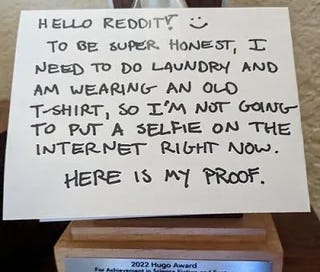[TLDR: I’m new to the “cozy” trend in genre. I’m of the “big threat/big climax” viewer/readership in genre fiction. I’m deep in my MFA work right now, working on a new novel which has structural similarities to this author’s work, new to me. I’m in a very rare MFA program that values genre fiction and equates it to standard literary fiction if it is written well enough. I would be interested to learn more about the author—if you have a post about her, please link in the comments.]
To Be Taught, If Fortunate is a novella by Becky Chambers, a queer science fiction author who is sometimes classified as “hopepunk”—the equal and opposite of “grimdark.” Hopepunk, as far as I can tell, balances on the premise that science can help make the future better, and that people and society can learn to be better people and get along. She has a series of books called Wayfarers that made her mark in science fiction.
The novella is an epistolary of sorts—it’s a report from a spaceship sent back to earth by some technological means. Although it’s initially said that it is a mission report, the writer within the book tells of her personal relationships with the other astronauts, which weren’t necessary for the scientists back home but are really welcome for us, the readers of the book outside the story. It’s as if we are the people on Earth in the future receiving this note, a message in a bottle.
There are four astronauts in a spaceship, sent off to a series of distant planets. The first trip takes over twenty years. We find out that the astronauts are put to cryogenic sleep for the trip. Although they age much more slowly, they do age while asleep. For this reason, they start as very young people when they leave and see their older bodies each time they wake when coming to new planets. The other implication of this is that these four people may not see another human for the rest of their lives; whatever world they’re on is The World and they are All The People.
What gives this book literary merit is the relationships among the four people as they explore new worlds together. There’s an emotional component of dealing with new discoveries and the loss of Earth and each planet as they leave it that’s not addressed in most science fiction. It’s not explicitly stated, but it’s implied that they become a “polycule” of sorts, in a romantic and familial sense simultaneously. Once we see them caring for each other, we care about them.
There’s a term moving among younger genre writers: “cozy.” Cozy horror. Cozy science fiction. I’ve never been quite clear as if there is a distinct definition, but I would classify this book as “cozy.” This is not a science fiction book with a murderous alien stowing away on a spaceship; this is a group of astronauts who cuddle when they’re sad and take extreme care not to disturb the ecosystems of the new worlds. They talk about their feelings and have emotional meltdowns. Regular science fiction: there’s an alien threat we must defeat to save us/the ship/humanity. Cozy science fiction: deep space is lonely, and I need to cuddle my fellow astronauts.
The fun of the book is that we discover each new planet as the characters do. Chambers does a fantastic job of imagining new species and ways a planet could operate. While she is not a scientist, she clearly did her research to describe how planets orbit, form, and sustain life forms. It’s so seamless, it’s impossible to determine where science fact meets science fiction. Except in extreme cases, as the bioengineering of their DNA so that these strange planets’ environments do not kill them immediately.
The major emotional crisis occurs when the transmissions from Earth stop completely. At this point, they have to consider that everyone on Earth has been wiped out—if so, they and any other astronauts on other ships are the last humans in the universe, and they will never see any people other than each other. The fantasies of “what will you do when you return?” stop abruptly, replaced by questioning, “why are we still doing this?”
To Be Taught, If Fortunate is a quick read, and a fun one, and sometimes wistful. It’s sad, but sad like a song in a minor key, not sad like something that’s actually happened to you. I really hate to compare anything to Donnie Darko, because that movie is full of loaded emotions —especially for the online community—and a rare example personally of a sad movie that I wanted to rewatch. Like, it’s not a bummer in the way that I’ll never reread Of Mice and Men, to take another overused example. It’s more of an endearing sad, like a picture of a wet puppy—kind of cute, but also you want to help it.




I don't read much sci fi but this "cozy" aesthetic seems cool.
My wife just read through all of Chambers. She quite enjoyed the ride.